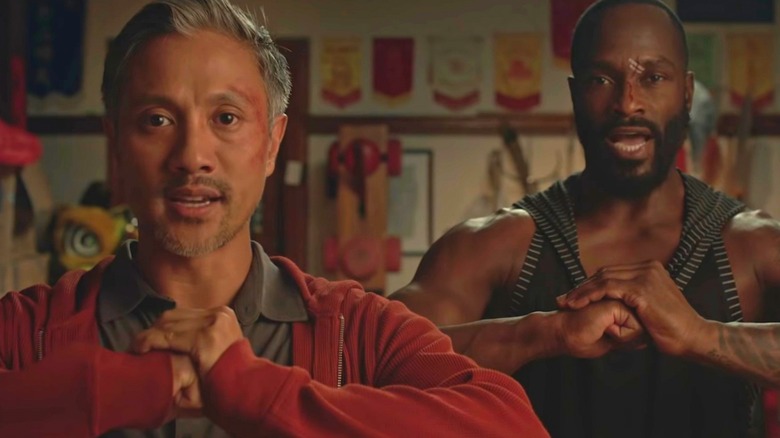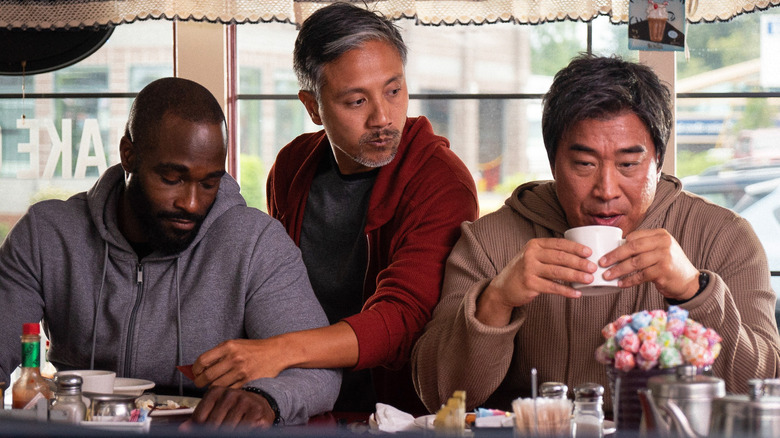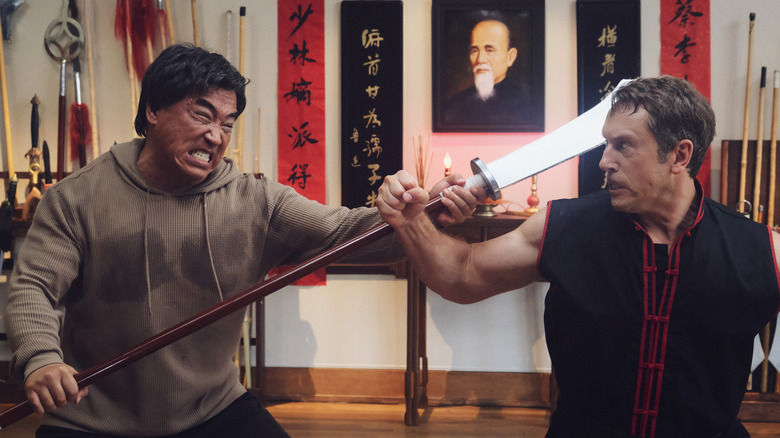Paper Tigers Review: Not Quite Too Old For This
When watching almost any film primarily concerned with depicting the beauty and brutality of martial arts, witnessing the skill and intensity of the lead performers tends to rank highly as one of the purest cinematic joys. There's something to be said for displaying such artful precision and proficiency within the medium. It's truly something to behold. But that's what makes Quoc Bao Tran's feature debut "The Paper Tigers" so special. It's not a film about a fighter in his prime kicking ass and taking names to the reptilian delight of its bloodthirsty audience, but instead a heartfelt story of middle-aged men whose bodies can no longer perform the tasks their minds were trained for.
The film follows three former best friends, Danny (Alain Uy), Hing (Ron Yuan), and Jim (Mykel Shannon Jenkins), each disciples of Sifu Cheung (Roger Yuan), a martial arts master who has recently died from a heart attack. Though devoted to his school and teachings in their youth up to adulthood, each of the men abandoned their Sifu and his lessons, and are now shuffling through lives as shells of the legends they once were.
In their youth, the "Three Tigers" were undefeated and untouchable fighters bonded by friendship and brotherhood, but when they reunite after decades of silence between them, it's because they believe their Sifu wasn't felled by natural causes, but something more sinister.
Tran's film splits the distance between mining the most comedy possible from watching three guys past their prime struggling to perform martial arts without their brittle bodies falling apart and telling a meaningful, personal story about growing older and losing the spark that makes life worth living. At times, it leans a little too hard in one of those diverging directions, but for the most part, it strikes a smart balance, overcoming crowdfunded budget constraints and a lack of brand-name stars to result in something as touching as it is genuinely entertaining.
No country for old men
When we first meet the "Three Tigers," it's as young children being tested by their chain-smoking Sifu, with Danny "8 Hands," the trio's ostensible leader, struggling to hold position over an injured ankle. He has to confess to his master that he was hurt from a schoolyard fight while defending their school's honor. But Sifu disabuses him of this skewed notion of what honor truly means, instilling in him the difference between fighting because you must and fighting for the sake of fighting. It's the first of many instances of the film showcasing the psychology and philosophy of martial arts as being as important, if not more so, than the ability to kick someone really hard.
But on the other side of the film's brilliant opening credits sequence, a VHS camcorder shot montage of the Tigers as elder teens wrecking house and showing off for their entire community, we find a Danny who couldn't be more different than that fiery child or that impressive young adult. Now in his mid-forties, Danny works in insurance, regularly disappoints his young son and his estranged ex-wife, and avoids all conflict, not just the ones honor dictates he should let slide. But the other two men have experienced their own falls from grace.
Hing has put on weight, wears a noticeably fake hairpiece, and suffered a leg injury that keeps him from being his former self. Of the three, he's the one who has maintained his love for kung fu the longest, the one who stuck around with Sifu the most, and the one who puts the most effort into masking his sadness with bravado. Hing is the one who brings them back together, as Danny and Jim had a falling out immediately after the opening credits that has made them bitter towards one another.
Jim stuck to combat sports, but is now an MMA instructor whose obsession with a good ground game has dulled his striking ability. Of the three, he seems to be the most physically fit but also the one who has lost the most pep in his step for their art.
Once the film has firmly established how not cut out for this investigation and revenge quest the men are, it repeatedly puts them in situations where they have to match up with people they could have absolutely destroyed in their youth, giving the audiences the desire to see even an inkling of the young men we fell for in the opening credits.
Instead, Tran stages each of the film's carefully orchestrated fight scenes as cruel rope-a-dopes, displaying scant flashes of that old fire in each man to get the viewer's hopes up for a comeback before dashing away any chance that could conceivably occur. It's set up in a way to get laughs at first, but the hits keep coming until the audience begins to feel the bruises and the shame themselves, feeling every failed block, every missed strike, as painful metaphors for the myriad ways life has of getting you down the further you get from your early twenties.
It isn't easy to take a relatively goofy conceit, of pointing at old men failing at kung fu and laughing, and wring genuine emotion from it, such that anyone who has ever felt older than their years, whose body cannot keep up with their mind, will feel such phantom pain through the screen. Much of the credit for that rests on the film's three leads, men who exhibit the right kind of chemistry with one another while each painting their own unique portrait of grief and regret.
Well, not EVERYONE was kung fu fighting...
But as fun as the film's more comedic hijinks are, the real special sauce is in the execution of its hand-to-hand combat. Tran, himself a disciple of famed choreographer/director Corey Yuen, does a brilliant job wringing maximum drama from the film's key physical conflicts.
In the film's first major fight scene, the Tigers have to face off against a trio of young bucks who want to take their undefeated crown, and without having to verbalize each of the older men's handicaps, the fights themselves display their weaknesses. Hing's fight is intense and shows he still has the verve and panache to keep up with these kids, but his bum leg and his weak conditioning make it impossible for him to win without crossing some lines. Danny, once avowed for his preternatural speed and focus, is so out of sync with himself he can't even get his footing. But Jim, the one the film suggests, up to this point, to be the most viable contender, has become so beholden to Brazilian jiu-jitsu that he doesn't know what to do in a fight if not immediately go for some variation of a blood choke.
Between that skirmish and a truly demoralizing three-on-one battle with Carter (Matthew Page) a dude they used to crush regularly as teens who has lived his entire adult life in their shadow, the movie repeatedly reinforces that these men have no business squaring up against misguided children or their former peers. So when it finally reveals the mysterious fighter who was strong and skilled enough to kill their master, the audience knows, deep down, none of these men, together or separate, stand a chance against him.
Tran does such a fine job building up this final threat, paying off an earlier throwaway gag about Hing mocking the sound one of Jim's students kicks make on a heavy bag by introducing this villain through the cacophonous ring his blows land from across a dimly lit gym. Martial arts films often share a structural kinship with the psychology of professional wrestling or the promotional tactics of boxing exhibitions. In that regard, "Paper Tigers" stacks the deck against some serious underdogs in such a way that victory seems absolutely impossible, while still framing this tale of redemption in such a way that the audience never gives up hope or tunes out.
It would be easy to just recommend this film for fans of "Cobra Kai" or anyone looking for some low-stakes action fun, but it would be a disservice to this impressive and warm little debut to discount its profound heart. There is a scene near the climax of "Paper Tigers" that features Danny on the phone teaching his young son the proper way to ball his fingers into a fist that has more dramatic power than a handful of films that were nominated for Oscars at last month's Academy Awards ceremony.
It's a testament to the love Tran put into this film and the serious effort all his collaborators returned in kind.


